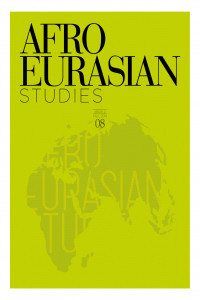-
-
Anahtar Kelimeler:
-
Evaluation of The Ukrainian Crisis Within The Context of Regional Security Complex Theory
Ukraine is geographically located as a buffer zone between Russia and Europe. The peoples of Ukraine have shared common historical cultures and backgrounds with the Russians. Ukraine is a trans corridor for the European Union (EU) in terms of energy transmission lines and has a coast to the Black Sea. Due to these factors, its strategic significance has increased for Russian Federation (RF). These common values that Ukraine has shared with Russia and its own strategic position have consistently been in the centre of Russian Federation’s near abroad doctrine. There have been two factors which have triggered the crisis in the region: the conflicting forms of perception of regional actors such as the EU and Russia Federation and the fact that the Ukrainian peoples have been continuously forced to choose one side. The main objective of this study is to assess the 2014 Crisis case within the framework of Russian Federation-UkraineEurope relations in line with the qualitative definition of the Regional Security Theory. First, the conceptual framework of the theory on which study is based will be drawn. Following this part, Ukraine will be assessed with considering historical, social and strategic vectors that it possesses and how these vectors affect its foreign policy making process and the effect of these vectors on security perception. Finally, after giving a brief background of the 2014 Crisis, the regional triggers of the crisis will be addressed, and the conception of these regional triggering factors which perceive Ukraine and how political expectations securitizes the region will be assessed
Keywords:
Regional Security Complex, Post-Soviet Area, European Security Area, Buffer Front Near Abroad Doctrine,
___
- The Statistics Portal. (2018). Taken from the https://www.statista.com/statistics/265407/ world-natural-gas-consumption-by-country/ on April 30, 2018
- World Bank Datas. (2018). Taken from the https://data.worldbank.org/indicator/SP.POP. TOTL?locations=UA on April 25, 2018
- Al, A., & Özdil, B. (2017). International Political Economy of the Black Sea: Reanalysis of Relations between Russia and Ukraine. Marmara University Journal of Political Science, 151-167.
- Balta, E. (2016). Introduction to Global Politics. Istanbul: İletişim Yayınları.
- Birdişli, F., & Gören, M. (2018). Immigration and Border Security Between Turkey and Iran in the Context of Regional Security Complex Theory. Journal of Studies on Iran, 11-38.
- Buzan, B., & Waver, O. (2003). Regions and Powers: The Structure of International Security. New York: Cambridge University Press.
- Dugin, A. (2016). Russian Geopolitics: Eurasian Approach. (V. Imanov, Trans.) Istanbul: Küre Yayınları.
- Erol, M. S. (Bahar 2014). “Ukraine-Crime Crisis” or “Second Yalta Process”. Black Sea Studies, 1-14.
- İmanbeyli, V. (2014). From an In-Country Crisis to an International Question: UkraineCrime Issue. Seta Perspektif.
- Keskin, M. (no date). Russian Foreign Policy in the Context of Neighborhood Doctrine: Ukrainian Intervention. 45-62.
- LAZĂR, M. S. (2014). The Ukraine Crisis Seen From A Regional Perspective: Isolated Conflict or Driving Agent For Regional Security Dynamics? Europolity, 37-61.
- Özdal, H. (2015). Ukraine Crisis in the Context of Internal-Regional-Global Dynamics. International Law and Policy, 69-102.
- Saraçlı, M. (Bahar 2015). Russians Abroad and Crimea in Russia’s Neighbourhood Policy. Black Sea Studies, 69-88.
- Sönmez, A., Bıçakçı, H., & Yıldırım, C. (2015). Analysis of Russian-Ukrainian Relationships in the context of the Crimean Problem. International Journal of Social Sciences and Education Research, 656-669.
- State Statistic Committee of Ukraine . (no date). Taken from the http://2001.ukrcensus.gov. ua/eng/results/general/nationality/ on April 25, 2018
- ISSN: 2147-110X
- Yayın Aralığı: Yıllık
- Başlangıç: 2012
- Yayıncı: Musiad (Independent Industrialists and Businessmen's Association)
